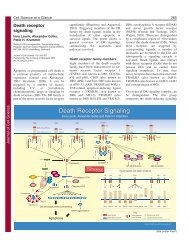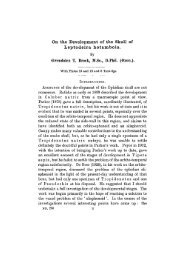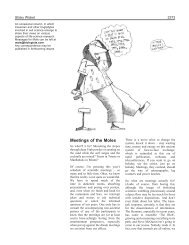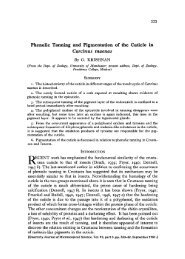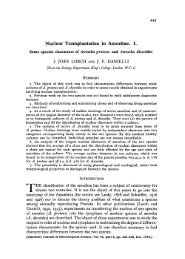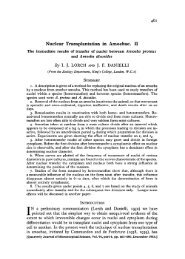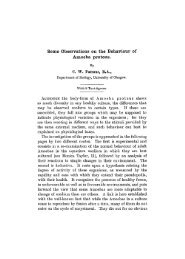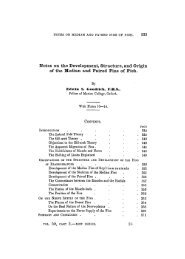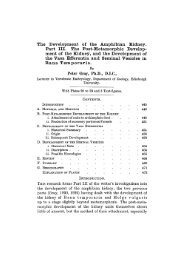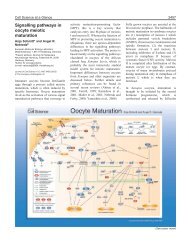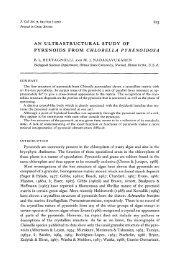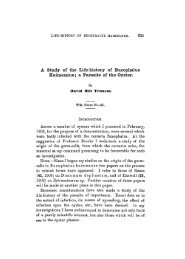A Criticism of the Cell-Theory; being an Answer to Mr. Sedgwick's ...
A Criticism of the Cell-Theory; being an Answer to Mr. Sedgwick's ...
A Criticism of the Cell-Theory; being an Answer to Mr. Sedgwick's ...
Create successful ePaper yourself
Turn your PDF publications into a flip-book with our unique Google optimized e-Paper software.
A CRITICISM OF THE CELL-THEORY. 153<br />
essentially similar process, a continuous sheet <strong>of</strong> pro<strong>to</strong>plasm<br />
containing m<strong>an</strong>y nuclei is formed as a tissue-constituent <strong>of</strong> a<br />
multicellular <strong>an</strong>imal or pl<strong>an</strong>t, we do not call <strong>the</strong> whole multinuclear<br />
tract a single cell—we call it a syncytium, or take<br />
some roundabout way <strong>of</strong> describing it. Such a case is <strong>the</strong><br />
formation <strong>of</strong> <strong>the</strong> endosperm in <strong>the</strong> embryo-sac <strong>of</strong> Ph<strong>an</strong>erogams.<br />
By repeated mi<strong>to</strong>tic division <strong>of</strong> <strong>the</strong> nucleus <strong>an</strong>d growth<br />
<strong>of</strong> <strong>the</strong> surrounding cy<strong>to</strong>plasm, a tract <strong>of</strong> continuous pro<strong>to</strong>plasm<br />
is formed, containing m<strong>an</strong>y nuclei. At a later stage<br />
partitions are formed <strong>an</strong>d <strong>the</strong> mass is divided up in<strong>to</strong> cells, but<br />
for a period <strong>the</strong> endosperm has a structure which recalls that<br />
<strong>of</strong> <strong>the</strong> Coeloblastse. C<strong>an</strong> we say that <strong>the</strong> condition in <strong>the</strong><br />
endosperm is <strong>to</strong> be regarded as multicellular because it is not<br />
perm<strong>an</strong>ent, <strong>an</strong>d that <strong>the</strong> condition in <strong>the</strong> Coeloblastse is <strong>to</strong> be<br />
regarded as unicellular because it is perm<strong>an</strong>ent ? If this is<br />
allowed <strong>the</strong> consequences are far-reaching, for it follows that<br />
<strong>the</strong> multinuclear phase in Actinosphserium <strong>an</strong>d o<strong>the</strong>r Pro<strong>to</strong>zoa<br />
is also multicellular, because not perm<strong>an</strong>ent.<br />
Take, again, <strong>the</strong> case <strong>of</strong> <strong>the</strong> Myce<strong>to</strong>zoa. The plasmodium <strong>of</strong><br />
Badharaia or Fuligo is not unicellular, for it is formed by <strong>the</strong><br />
union <strong>of</strong> m<strong>an</strong>y cells: it is not called multicellular, because<br />
<strong>the</strong>re are no cell divisions : yet we draw, rightly enough, a<br />
distinction between <strong>the</strong> plasmodium, where cell bodies fuse but<br />
<strong>the</strong> nuclei do not unite, <strong>an</strong>d <strong>the</strong> single cell resulting from, conjugation,<br />
where <strong>the</strong> nuclei do unite.<br />
A survey <strong>of</strong> <strong>the</strong> facts must lead <strong>to</strong> <strong>the</strong> conclusion that <strong>the</strong>re<br />
is <strong>an</strong> intermediate phase between <strong>the</strong> unicellular <strong>an</strong>d <strong>the</strong> multicellular<br />
condition, which is <strong>the</strong> multinucleate but non-cellular<br />
condition, 1 <strong>an</strong>d that <strong>the</strong>re is no fundamental distinction<br />
1 The term non-cellular does not exactly represent <strong>the</strong> condition which it<br />
is intended <strong>to</strong> describe. Yet, if one adheres <strong>to</strong> existing nomenclature, it is<br />
difficult <strong>to</strong> find a substitute. The term "cell," though founded on <strong>an</strong><br />
erroneous conception, is so firmly established in biological l<strong>an</strong>guage that it<br />
would probably be impossible <strong>to</strong> eject it. Yet if one were <strong>to</strong> make general<br />
use <strong>of</strong> <strong>the</strong> Greek equivalent KVTIS (literally a little box), which has already<br />
come in<strong>to</strong> such favour as <strong>to</strong> have respectable claims on our attention, ons<br />
might adopt much more exact expressions. Thus <strong>the</strong> uninucleate Pro<strong>to</strong>zoa<br />
might be said <strong>to</strong> exhibit a monocjtial condition, multicellular org<strong>an</strong>isms a



